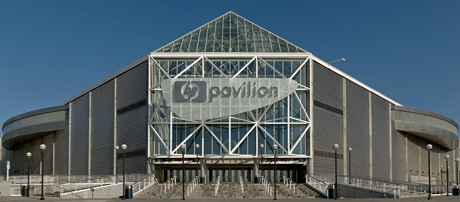.
When the San Jose Arena first opened in 1993, I remember standing in a long line in order to apply for a job. Several friends who were also keen to work at the impressive new venue accompanied me. We thought it would be great to work in this facility. At the time, with the benefit of 22 years of wisdom, we did not understand the level of risk taken by the city of San Jose, or the massive investment that the Redevelopment Agency (RDA) had made on behalf of the city. Out of our group of five, two of us were hired, including myself. I was so happy to work in this fine facility and make “minimum wage plus tips” that I didn’t mind getting the haircut that my future supervisor requested.
So how, exactly, did our shiny new arena enter the scene? The now-defunct Redevelopment Agency had purchased the land in the 80s, and in 1988 voters approved the construction of the building that many fans now fondly call “the Shark Tank” for $162 million. Most would agree that the arena has been a huge success for San Jose, giving residents a place to gather for sports and entertainment. It provided a “shot in the arm” to our downtown, and draws people to the region. As a San Jose native, it brings me great pleasure and a strong sense of pride to hear arena visitors conclude that they have an overall positive impression of our city.
The annual cost to SAP for naming rights is $3.35 million, which is to be split evenly between the Sharks and the city of San Jose. This agreement provides the city with $1.675 million annually, and $8.375 million over the five-year term, of which the general fund nets $1.3 million or $6.5 million over the same term. This includes an allotment of $250,000 each year that the City Council and mayor may allocate to charities, school PTAs and other organizations that benefit San Jose residents. An additional $125,000 each year is provided to the council and mayor for constituent outreach, which eliminates the need for year-round fundraising by the elected official. I wrote about this back in 2007.
The transfer of the naming rights from HP to SAP is a positive move. First, SAP is a software company known the world over. San Jose is internationally known as a tech-centric city, and also the home of a well known NHL team. Having a European company hold the naming rights is a good thing, as we are a global city. Although not a household name for some outside of the technology industry, SAP touts local clients such as Adobe, Apple, eBay, HP, Intuit, and Tesla, and many other global clients as well, including EMC, General Motors, Hasbro, Honeywell, Proctor & Gamble and Siemens. With clients like this, we have a secure naming rights client with a multi-billion dollar market cap and global brand recognition.
Alternatively, the city could have accepted bids from other corporations. However, given a choice between Domino’s Pizza Palace or the Doritos Nacho Cheese Arena or others, I think that staying with a technology company is more in keeping with the international image of San Jose. The city did contract with a consulting group familiar with naming rights, and their report—which compared 20 other naming contracts from across country—concluded that $3.35 million is a fair price.
Let’s hope that this win-win outcome results in further victories on the ice for the Sharks, culminating in a Stanley Cup championship some time before high-speed rail comes to San Jose in 2027.

